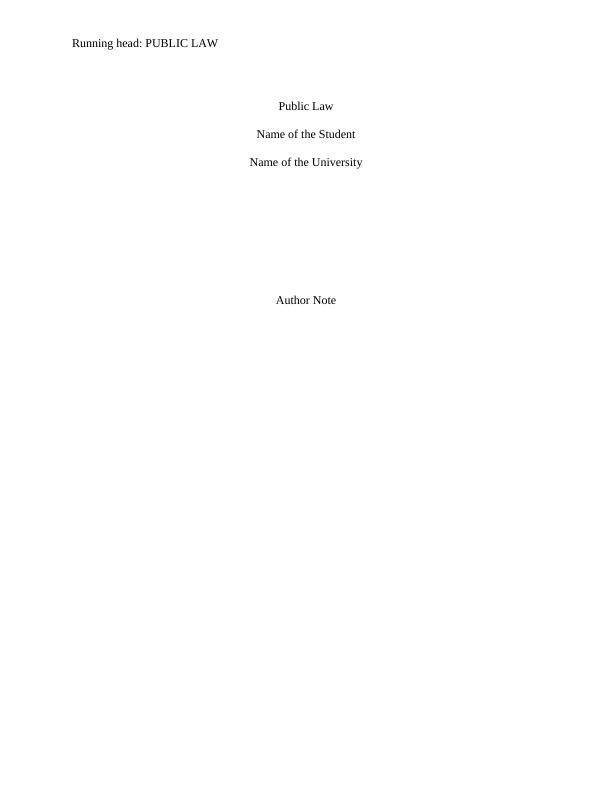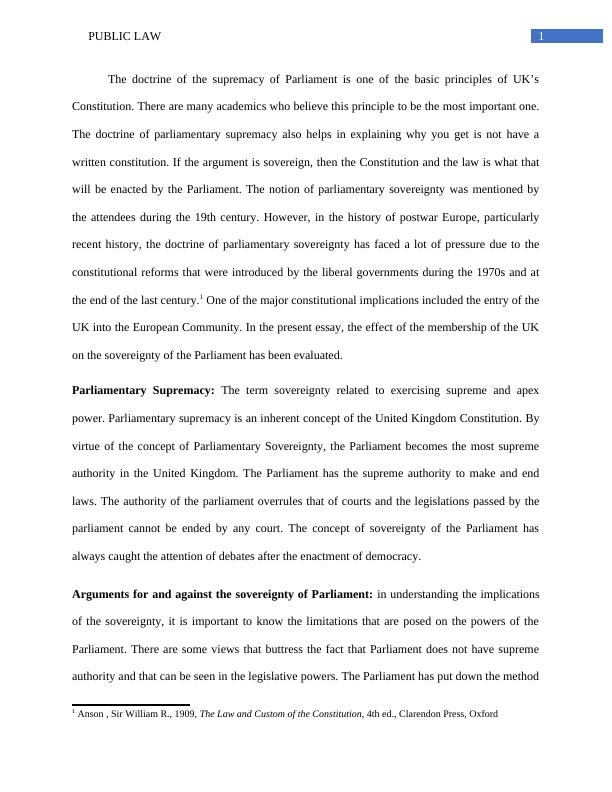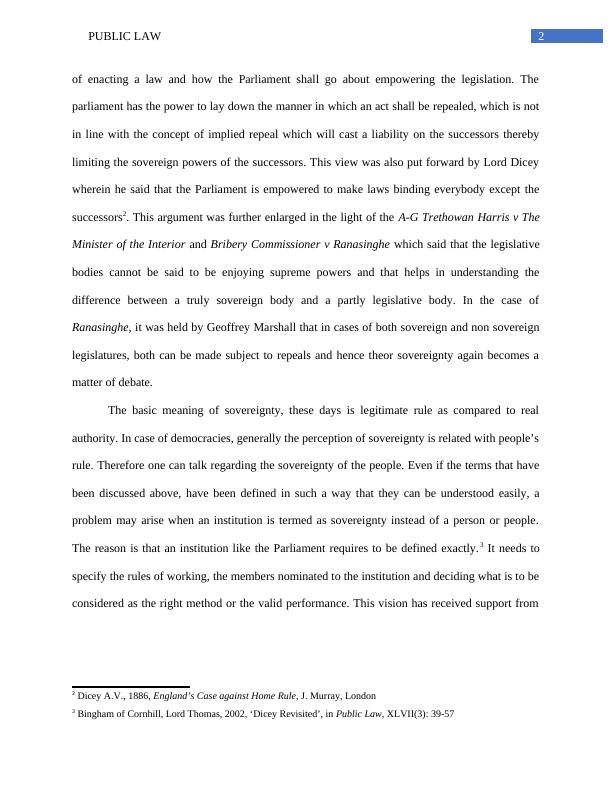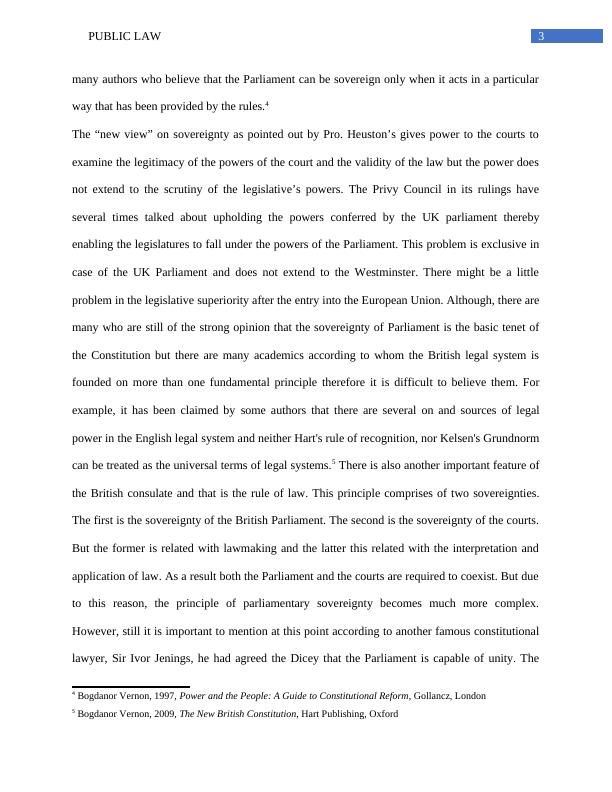The Effect of UK's Membership on the Sovereignty of Parliament
13 Pages3901 Words158 Views
Added on 2023-06-12
About This Document
This essay evaluates the effect of UK's membership on the sovereignty of Parliament, discussing the doctrine of parliamentary supremacy, arguments for and against it, and the impact of European and binding treaties.
The Effect of UK's Membership on the Sovereignty of Parliament
Added on 2023-06-12
ShareRelated Documents
Running head: PUBLIC LAW
Public Law
Name of the Student
Name of the University
Author Note
Public Law
Name of the Student
Name of the University
Author Note

1PUBLIC LAW
The doctrine of the supremacy of Parliament is one of the basic principles of UK’s
Constitution. There are many academics who believe this principle to be the most important one.
The doctrine of parliamentary supremacy also helps in explaining why you get is not have a
written constitution. If the argument is sovereign, then the Constitution and the law is what that
will be enacted by the Parliament. The notion of parliamentary sovereignty was mentioned by
the attendees during the 19th century. However, in the history of postwar Europe, particularly
recent history, the doctrine of parliamentary sovereignty has faced a lot of pressure due to the
constitutional reforms that were introduced by the liberal governments during the 1970s and at
the end of the last century.1 One of the major constitutional implications included the entry of the
UK into the European Community. In the present essay, the effect of the membership of the UK
on the sovereignty of the Parliament has been evaluated.
Parliamentary Supremacy: The term sovereignty related to exercising supreme and apex
power. Parliamentary supremacy is an inherent concept of the United Kingdom Constitution. By
virtue of the concept of Parliamentary Sovereignty, the Parliament becomes the most supreme
authority in the United Kingdom. The Parliament has the supreme authority to make and end
laws. The authority of the parliament overrules that of courts and the legislations passed by the
parliament cannot be ended by any court. The concept of sovereignty of the Parliament has
always caught the attention of debates after the enactment of democracy.
Arguments for and against the sovereignty of Parliament: in understanding the implications
of the sovereignty, it is important to know the limitations that are posed on the powers of the
Parliament. There are some views that buttress the fact that Parliament does not have supreme
authority and that can be seen in the legislative powers. The Parliament has put down the method
1 Anson , Sir William R., 1909, The Law and Custom of the Constitution, 4th ed., Clarendon Press, Oxford
The doctrine of the supremacy of Parliament is one of the basic principles of UK’s
Constitution. There are many academics who believe this principle to be the most important one.
The doctrine of parliamentary supremacy also helps in explaining why you get is not have a
written constitution. If the argument is sovereign, then the Constitution and the law is what that
will be enacted by the Parliament. The notion of parliamentary sovereignty was mentioned by
the attendees during the 19th century. However, in the history of postwar Europe, particularly
recent history, the doctrine of parliamentary sovereignty has faced a lot of pressure due to the
constitutional reforms that were introduced by the liberal governments during the 1970s and at
the end of the last century.1 One of the major constitutional implications included the entry of the
UK into the European Community. In the present essay, the effect of the membership of the UK
on the sovereignty of the Parliament has been evaluated.
Parliamentary Supremacy: The term sovereignty related to exercising supreme and apex
power. Parliamentary supremacy is an inherent concept of the United Kingdom Constitution. By
virtue of the concept of Parliamentary Sovereignty, the Parliament becomes the most supreme
authority in the United Kingdom. The Parliament has the supreme authority to make and end
laws. The authority of the parliament overrules that of courts and the legislations passed by the
parliament cannot be ended by any court. The concept of sovereignty of the Parliament has
always caught the attention of debates after the enactment of democracy.
Arguments for and against the sovereignty of Parliament: in understanding the implications
of the sovereignty, it is important to know the limitations that are posed on the powers of the
Parliament. There are some views that buttress the fact that Parliament does not have supreme
authority and that can be seen in the legislative powers. The Parliament has put down the method
1 Anson , Sir William R., 1909, The Law and Custom of the Constitution, 4th ed., Clarendon Press, Oxford

2PUBLIC LAW
of enacting a law and how the Parliament shall go about empowering the legislation. The
parliament has the power to lay down the manner in which an act shall be repealed, which is not
in line with the concept of implied repeal which will cast a liability on the successors thereby
limiting the sovereign powers of the successors. This view was also put forward by Lord Dicey
wherein he said that the Parliament is empowered to make laws binding everybody except the
successors2. This argument was further enlarged in the light of the A-G Trethowan Harris v The
Minister of the Interior and Bribery Commissioner v Ranasinghe which said that the legislative
bodies cannot be said to be enjoying supreme powers and that helps in understanding the
difference between a truly sovereign body and a partly legislative body. In the case of
Ranasinghe, it was held by Geoffrey Marshall that in cases of both sovereign and non sovereign
legislatures, both can be made subject to repeals and hence theor sovereignty again becomes a
matter of debate.
The basic meaning of sovereignty, these days is legitimate rule as compared to real
authority. In case of democracies, generally the perception of sovereignty is related with people’s
rule. Therefore one can talk regarding the sovereignty of the people. Even if the terms that have
been discussed above, have been defined in such a way that they can be understood easily, a
problem may arise when an institution is termed as sovereignty instead of a person or people.
The reason is that an institution like the Parliament requires to be defined exactly.3 It needs to
specify the rules of working, the members nominated to the institution and deciding what is to be
considered as the right method or the valid performance. This vision has received support from
2 Dicey A.V., 1886, England’s Case against Home Rule, J. Murray, London
3 Bingham of Cornhill, Lord Thomas, 2002, ‘Dicey Revisited’, in Public Law, XLVII(3): 39-57
of enacting a law and how the Parliament shall go about empowering the legislation. The
parliament has the power to lay down the manner in which an act shall be repealed, which is not
in line with the concept of implied repeal which will cast a liability on the successors thereby
limiting the sovereign powers of the successors. This view was also put forward by Lord Dicey
wherein he said that the Parliament is empowered to make laws binding everybody except the
successors2. This argument was further enlarged in the light of the A-G Trethowan Harris v The
Minister of the Interior and Bribery Commissioner v Ranasinghe which said that the legislative
bodies cannot be said to be enjoying supreme powers and that helps in understanding the
difference between a truly sovereign body and a partly legislative body. In the case of
Ranasinghe, it was held by Geoffrey Marshall that in cases of both sovereign and non sovereign
legislatures, both can be made subject to repeals and hence theor sovereignty again becomes a
matter of debate.
The basic meaning of sovereignty, these days is legitimate rule as compared to real
authority. In case of democracies, generally the perception of sovereignty is related with people’s
rule. Therefore one can talk regarding the sovereignty of the people. Even if the terms that have
been discussed above, have been defined in such a way that they can be understood easily, a
problem may arise when an institution is termed as sovereignty instead of a person or people.
The reason is that an institution like the Parliament requires to be defined exactly.3 It needs to
specify the rules of working, the members nominated to the institution and deciding what is to be
considered as the right method or the valid performance. This vision has received support from
2 Dicey A.V., 1886, England’s Case against Home Rule, J. Murray, London
3 Bingham of Cornhill, Lord Thomas, 2002, ‘Dicey Revisited’, in Public Law, XLVII(3): 39-57

3PUBLIC LAW
many authors who believe that the Parliament can be sovereign only when it acts in a particular
way that has been provided by the rules.4
The “new view” on sovereignty as pointed out by Pro. Heuston’s gives power to the courts to
examine the legitimacy of the powers of the court and the validity of the law but the power does
not extend to the scrutiny of the legislative’s powers. The Privy Council in its rulings have
several times talked about upholding the powers conferred by the UK parliament thereby
enabling the legislatures to fall under the powers of the Parliament. This problem is exclusive in
case of the UK Parliament and does not extend to the Westminster. There might be a little
problem in the legislative superiority after the entry into the European Union. Although, there are
many who are still of the strong opinion that the sovereignty of Parliament is the basic tenet of
the Constitution but there are many academics according to whom the British legal system is
founded on more than one fundamental principle therefore it is difficult to believe them. For
example, it has been claimed by some authors that there are several on and sources of legal
power in the English legal system and neither Hart's rule of recognition, nor Kelsen's Grundnorm
can be treated as the universal terms of legal systems.5 There is also another important feature of
the British consulate and that is the rule of law. This principle comprises of two sovereignties.
The first is the sovereignty of the British Parliament. The second is the sovereignty of the courts.
But the former is related with lawmaking and the latter this related with the interpretation and
application of law. As a result both the Parliament and the courts are required to coexist. But due
to this reason, the principle of parliamentary sovereignty becomes much more complex.
However, still it is important to mention at this point according to another famous constitutional
lawyer, Sir Ivor Jenings, he had agreed the Dicey that the Parliament is capable of unity. The
4 Bogdanor Vernon, 1997, Power and the People: A Guide to Constitutional Reform, Gollancz, London
5 Bogdanor Vernon, 2009, The New British Constitution, Hart Publishing, Oxford
many authors who believe that the Parliament can be sovereign only when it acts in a particular
way that has been provided by the rules.4
The “new view” on sovereignty as pointed out by Pro. Heuston’s gives power to the courts to
examine the legitimacy of the powers of the court and the validity of the law but the power does
not extend to the scrutiny of the legislative’s powers. The Privy Council in its rulings have
several times talked about upholding the powers conferred by the UK parliament thereby
enabling the legislatures to fall under the powers of the Parliament. This problem is exclusive in
case of the UK Parliament and does not extend to the Westminster. There might be a little
problem in the legislative superiority after the entry into the European Union. Although, there are
many who are still of the strong opinion that the sovereignty of Parliament is the basic tenet of
the Constitution but there are many academics according to whom the British legal system is
founded on more than one fundamental principle therefore it is difficult to believe them. For
example, it has been claimed by some authors that there are several on and sources of legal
power in the English legal system and neither Hart's rule of recognition, nor Kelsen's Grundnorm
can be treated as the universal terms of legal systems.5 There is also another important feature of
the British consulate and that is the rule of law. This principle comprises of two sovereignties.
The first is the sovereignty of the British Parliament. The second is the sovereignty of the courts.
But the former is related with lawmaking and the latter this related with the interpretation and
application of law. As a result both the Parliament and the courts are required to coexist. But due
to this reason, the principle of parliamentary sovereignty becomes much more complex.
However, still it is important to mention at this point according to another famous constitutional
lawyer, Sir Ivor Jenings, he had agreed the Dicey that the Parliament is capable of unity. The
4 Bogdanor Vernon, 1997, Power and the People: A Guide to Constitutional Reform, Gollancz, London
5 Bogdanor Vernon, 2009, The New British Constitution, Hart Publishing, Oxford

End of preview
Want to access all the pages? Upload your documents or become a member.
Related Documents
The doctrine of parliamentary sovereignty relevant to the UK constitutionlg...
|6
|3533
|290
Parliamentary Supremacy and Internal Market Billlg...
|10
|2656
|30
Brexit and its Effect on Parliamentary Sovereigntylg...
|10
|3550
|71
The Keystone of the Constitution: Executive vs Parliamentlg...
|9
|2439
|48
Brexit and its Effect on Parliamentary Sovereigntylg...
|6
|2061
|55
Business Law Assignment - Sources of Law in UKlg...
|15
|4710
|251
